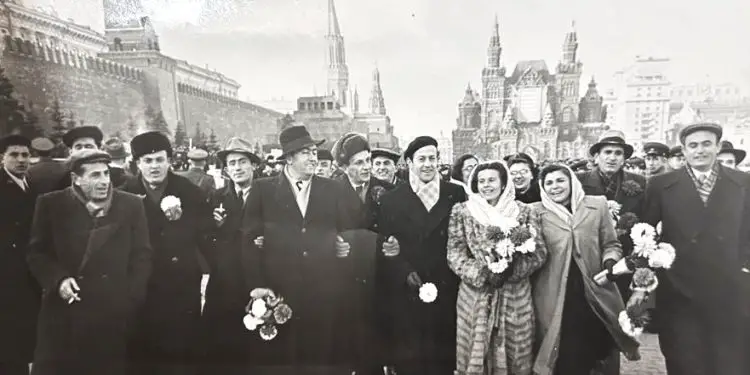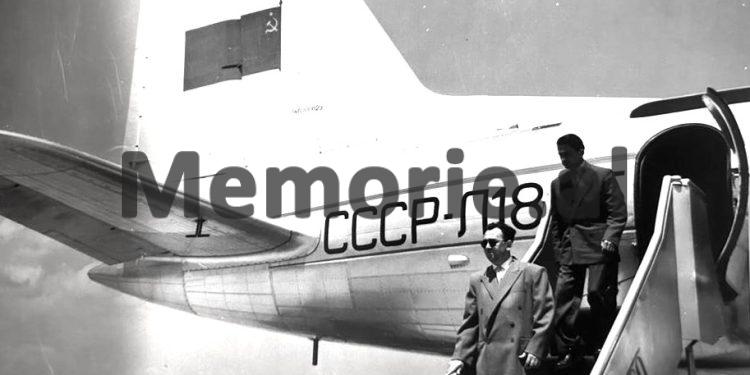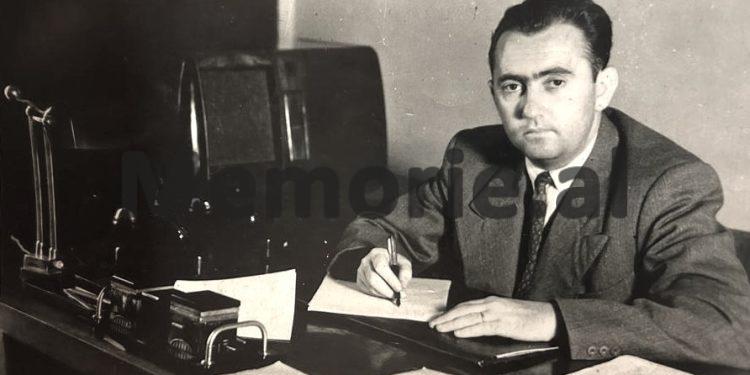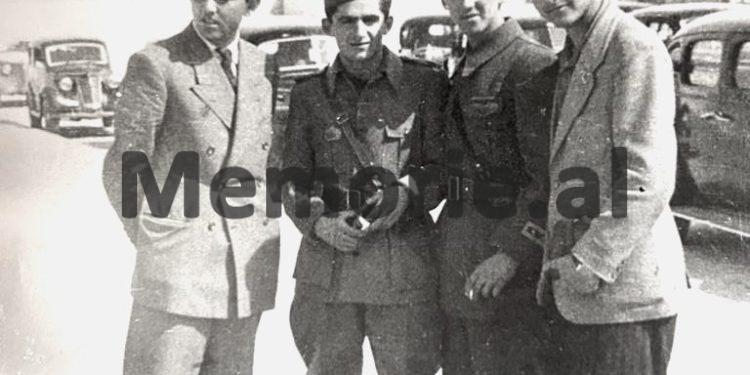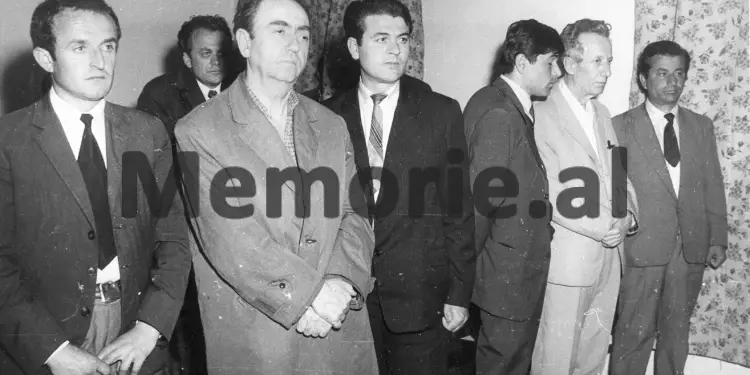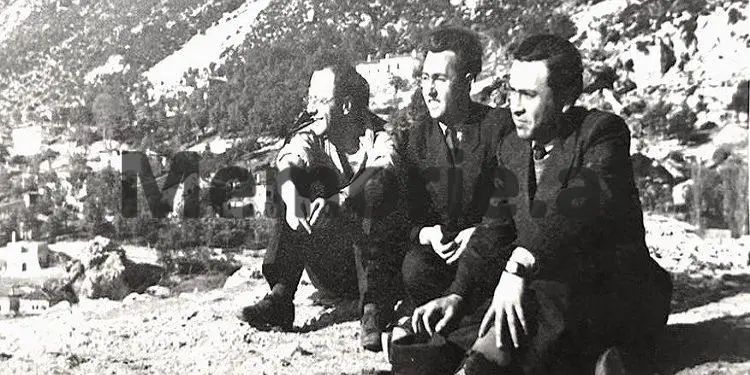By Fadil Paçrami
Part fourteen
Memorie.al / What is prison? It is the place where those who have been sentenced to deprivation of liberty are kept, we would say by reading any dictionary. But that is little. Prison and freedom – two opposites. Previously: what is freedom? In short: to be free means to do what you want, to think and act as you wish in the exercise and fulfillment of your freedoms and rights, as a person and as a citizen, but always without harming and violating others. . Again: to think and act. We are talking about democratic freedoms, from those of speech, press, assembly and organization in various parties and associations, ensuring the conditions where ideas, requests and human wills can find expression and concretization, from those of the biological-related plan with the being itself, to those of the social plan, related to the ways of living.
Continues from last issue
IN ANSWER TO THE FALSE ACCUSATIONS….
(Notes for an analysis about some facts of the events thrown in the prison). They were drawn up not long after the death of Enver Hoxha, as notes for an analysis of some facts and events that happened and related to me, in response to the accusations that were made against me, but which I did not send anywhere, at that time it seemed a little too soon; likewise later, with all the additions I made, – they seemed incomplete to me. So they remained on pieces of paper as notes, thrown in pieces. I had not even decided where I would send them: to the Central Committee or…. they would remain with me, until the day…! When? At first glance.
I thought I would write these notes in response to the accusations made against me and send them. A lot has been said by others, I will also speak. Maybe I will be called stupid. But if to tell the truth, you wanted to be stupid, then: long live stupidity! Something pushed me and rightly so, not just the defense itself. I’m explaining myself: I carefully follow everything that happens and what is written in the press, I understand as much as possible, from the place where I am – the infamous Burrel prison.
For a long time, I have been harassed and not left alone by a lot of truths, which have been covered up and distorted, but which today’s developments make clearer. I don’t even see any predisposition to say so. Why so? Until when? So far I haven’t had a chance either, I had a hard time before: in the 4th Plenum and after it, even later. Others are silent, because they are afraid or because they don’t want to. Then how? Shouldn’t it?! No, you have to. It’s time.
Each of those who lived that time of the 60s and early 70s, the events and developments that happened as a whole and for special occasions, have a lot to say. For what not: deeds and non-deeds, truths and untruths, what is said and what is not said. Even more so today, why today? That today calls us, asks us. It’s been years, a lot of water has flowed.
There is also an evil accumulated, which, if it was not looked straight in the eye, was not recognized as such and was not thrown away until it is too late, it will come deepening and it will not be known the bottom. And this should be done by everyone – it is understood, who more and who less, since the recognition is not the same, the feats weigh the same, the burdens are carried the same. I have one more reason: what I have not been accused of, it is my right, I think.
It is said: the world is a closet. Meaning: it moves left and right, up and down, or vice versa. Another: it can be seen from the top of Olympus, where you are today (I was once too), and from the plane where the many are, and from the ninth circle of hell, where I am today. I mean: it’s good to hear as many voices as possible, why not from here. Maybe for the cases when I go above my own, I will be told: you don’t need these jobs. I can’t.
It wouldn’t even be fair. There are no monopolies when it comes to the destinies of the country. Or even this: it was not left to guess from there, how and what should be done! This is also a first angle, even very sensitive, to storms and winds that blow in the heights. These words of Shakespeare, put into the mouth of King Lear, about the prison, remain epitomized:
“There we will hear from prisoners
We will talk about what they look like in the palace
Who wins and who loses and who
It has the power today and who lost it.
In prison we will see how they come and go
The glories of the great ones,
They go up and down according to the moon”.
Analogies and precedents remain indicators that are worth keeping in mind in historical developments. But let’s go back to where we started: there are many who have something to say. I will talk about what I know and remember, they are more directly related to me. Thus, part by part, the whole is reached. The parts complete the framework of the whole, they are its appearance and mirror. Known: even in a drop of water, the horizon is reflected. I’m starting.
1.
I had to read everything I could find, in the speeches and other writings published by Enver Hoxha, before and after ’73, for me. Some I didn’t even know. I was surprised: how much space has cost me! Why? It becomes clear: the blow was aimed not at a Fadil, a Todi, or anyone else, but farther and wider; the second, it seems, did not have an easy time convincing others, as it operated in sensitive spheres of culture and intelligence.
I’m saying it from the beginning: many unknowns have been said, facts, events and conversations have been distorted, the truth has been covered and hidden, and the essence, causes and goals have not been said. So he can’t be silent. I know: don’t bully the powerful because their anger has consequences, they say. But, the truth above all – this is where I start from, that is why I take this step. In this view, what follows below is both a defense and a protest, but more of an accusation. I’m starting from the 60s, to reach the 73s, how this story of mine began and ended (the second after the one from 47). At that time I was in Moscow, for studies.
Although classes had started in September, I was called to Tirana in the Plenum of the Central Committee, where the known measures against Liri Belishova and Koço Tashko were discussed and taken. I noticed that those at the embassy, especially the Security there, were very interested and a little concerned, until I left for Albania. Apparently, since my wife and children were with me, who had come during those summer months, the doubt arose that I would not return at all. I was convinced of this by how I was received and by some conversation.
As I came to understand later, in some way such a thing was desired, so that it could be used as; “argument”, for “hostility”, and other charges. Such things had happened before, pushing people to commit suicide, as in the case of Nako Spiro, which made the accusations against him easier and more deceptive. Even then they have been repeated, it happened like this. But I didn’t do what was expected and I came, I didn’t fall into that trap. This was somewhat surprising and made it difficult to clear the charges, as was intended. I gave up and wasn’t bullied. But the shadow of doubt did not leave me, it followed me from behind, surrounded me everywhere and appeared in one form or another.
In short, at that time I was caught between two truths, on the one hand, I was in favor of the liberalization of all party and state activity, which was required and began to appear after the attack on the cult of Stalin’s hard line, on the other hand, had nurtured dogmatism, violence and terror, suppression of thought, denial of freedom and human rights, bureaucratism, extreme centralization and others, so to proceed as in other countries of the East: on the other hand, I was in favor of breaking away from that kind of paternalism, the dictation of insufferable arrogance, which the Soviets displayed and had led to a visible limitation of the country’s independence, the disregard of dignity and national pride.
In this dilemma, many intellectuals and honest people have happened in those years. Of many factors, among which national sentiments have taken a primary place (as a late state-forming country, we have not yet had enough of independence), there was a pronounced tendency for the second. This, even though the causes, motives and other whys, which led to the destruction undertaken by Enver Hoxha, with the Soviet Union, the socialist camp and the Warsaw Treaty, were not deeply analyzed and understood in the beginning. The hope arose that perhaps the time had come for liberation from the tutelage of Slavic-Russian despotism, which succeeded the former Byzantine and Ottoman one. But it didn’t happen like that. Disappointment soon followed. The game was also understood since year by year, it became clearer.
Well, the conditions and possibilities were there for taking this step of separation. Years had passed since that time, when in Yalta our country was left by the big ones, in the Eastern Bloc, the divisions and obligations of those first years were not so rigid. The Yugoslav phenomenon in ’48 had shown this. I’m not talking about the path and goals of Belgrade, or about following any example from anyone, but about not being forced to divide the areas of influence, made by the greats of the time, regardless of the wishes of the interested parties. There were also opportunities. Why shouldn’t this country of ours decide for its own good, in the conditions created?! In addition, we did not even have a common border with any of the Warsaw Pact countries, so there was no risk of armed intervention with tanks from Moscow, as happened in ’56 with Hungary, also happened in ’68 with Czechoslovakia.
But as it became clear later, now even more so, the enmity with Nikita Khrushchev and opposition to Moscow had other bases and goals. They were brought to the fore and strongly taught, as much as nationalism and national pride; as well as ideological contradictions: the fight against revisionism, treason and capitulation to imperialism, etc., whereas in reality, it was the fear of losing the leadership position, at the head of the party and the state, as had happened to most of the leaders of the countries others of the Eastern Bloc, under pressure and known machinations – some overthrowing them with plenum decisions, others sending them to that world.
Enver Hoxha was afraid of this. What was also told about a story of poisoning, with a confusion of places, during a dinner in the Kremlin, related to a leader of another party, who, not many days later, died.
The question has often been asked: why didn’t it happen to us, at that time, like to others? This is explained by the impotence of the country’s anti-Stalinist and anti-dictator forces (consecutive strikes that, as is known, had occurred carefully to leave the country without capable forces and political figures had given their results), as well as the rare demonic abilities with which he acted.
The hegemonic tendencies that appeared openly, exactly where in the Communist Party of China, for the leadership role of Mao Zedong in the communist movement, and that were used by both sides, to their own benefit, helped for this. They did not bring anything good for Albania. Thus, a complicated conjuncture was created, with many surprises and paradoxes:
– On the one hand, Albania broke away from the Eastern Bloc, de facto also left the Warsaw Treaty (later also de jure), threw away the Russian yoke, which limited the country’s sovereignty, that’s why this step taken in ’61- ‘n, he found and secured a wide support among the people and the democratic forces created hope among those who had always viewed the dictatorship and ties with Moscow with distrust…!
On the other hand, the confrontation with the Khrushchevites maintained the risk of restraining liberalism and deepening the path of Stalinism, accompanied by extremism and centralizing economic and cultural tendencies, the establishment of a regime of terror and the closure and further isolation of the country, etc. as it happened.
– On the one hand, we freed ourselves from that kind of addiction disguised with an attractive phraseology, full of promises for the future, that’s why it was initially greeted and supported by many…! On the other hand, there appeared the danger of passing under dependence, of the same type of expansion of relations with China, another Asian country with the remains of a feudal despotism, grafted with the ambitions of ruling a great state.
– On the one hand, the possibility was created that, being free and independent, we could enter into relations with all countries on the basis of equality, mutual respect and bilateral or multilateral interests, as was thought and expected to be achieved… ! On the other hand, there was a regression and it turned into enmity with everyone, and separation with the world to the detriment of the country’s developments.
***
It can be said with a full mouth, that the opportunity was not used profitably, there was a lack of clarity, but rather the will and readiness, and all this, because the starting point, the goal and the destination were different – the narrow personal and party interests were placed above everything.
The separation from the Eastern Bloc was greeted and welcomed by the countries of the West. The conditions were created for other, broader relations with everyone and in the most diverse spheres, definitely also the economic ones, for the withdrawal of loans and aid for what we needed and they could offer. It is understood not for beautiful eyes and special sympathy – such notions in politics, and even less in the economic field, are not decisive, but an Albania with its geographical position on the shores of the Adriatic, with access to the Mediterranean, even if it is neutral, was of interest to them. The exit from the Warsaw Treaty was valued as something of great importance; our country was no longer and could not return to a naval base, and an aircraft carrier for that matter.
NATO without words that was interested in this. She spent a lot of money on building and maintaining military bases and her Mediterranean fleet, airports and missile ranges in Italy, among others. Now he could reduce these, or not add them further. So the help to us, even just as compensation, will be small in this case. Was this known? I say yes. I once heard Enver Hoxha boasting that; somewhere in a NATO meeting, it was said that this position of Albania, neither there nor here, even if it is that favorable for it, should not be harassed, on the contrary, should be encouraged to continue on that path.
Then why wasn’t it used? Huh, why wasn’t it used? It was not only political, how can it be explained?! Maybe one day something more concrete can be said, based on the documents that will come to light.
The country was further damaged by isolation from the world – neither Easy nor West, emphasizing and insisting on what was called and inflated so much; “with our own forces” – something completely absurd, (light-short), conceited and unrealistic, with serious consequences for the economy and, in all areas. They appeared in the early years and throughout the 60s. The consequences were somewhat softened by the aid from China, without which the hands would have been raised quickly, but in the 70s, these came decreasing, until they were completely cut off. Even the last reserves were eaten. Then, what to do?
The events that took place in the 60s proved what was said above. The country entered a dead end. People saw that the separation from the East was fictitious. The illusions of all those who expected a freer, healthier breath also fell. This was felt very quickly. Most notably, there were frustrations in intellectual circles. Enver Hoxha noticed this and built a policy similar to that of the year 1948, when relations with Belgrade were cut, known as that of the kulache and the curmudgeon, with demagoguery and fear at the same time. A little too much (in ’62, if I don’t confuse it) he held a large meeting with the intellectuals of the capital and spoke in front of them about the state of the country and abroad. He also participated in a meeting with writers and artists. In both cases, he treated them better, elevating their role, but he also threatened and warned them to be careful.
This duality in the dreams and the deeds that followed was strongly felt by many in the ranks of intellectuals and creators, in both views. Below, I will focus on some issues and events that happened to me.
– In 1965, I was appointed Minister of Culture and Arts, but I was also criticized in the Politburo by Enver Hoxha, when I was called to inform me of the decision, emphasizing three issues, for which he did not forgive and constitute the essence of the concerns of the time, related to intellectuals: not subjugating free thought, genuine creativity, outside the official framework. So he addressed me: “First of all, I want to say that in the implementation of the Party’s line, you do not seem to have that vitality, that care and that persistence, which should exist in a cultured and old cadre in, work…! Memorie.al
The next issue follows




